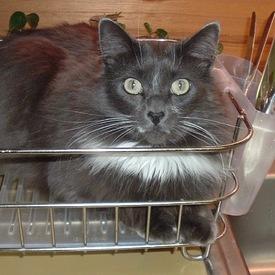Question about burning fat and where it goes.

DameVenus
Posts: 70 Member
This may be a really stupid question but my teacher always said there was no such thing.
Anyway, I hear some fat turns into muscle when you work out but I wanted to know in general where does the fat go? Is it just burned as energy like calories or does the body shed it and it leaves the body when you use the bathroom or gets flushed out when you drink water (I always thought that was the reason water in always a common tip in losing weight).
Sorry for the silly question but I am just curious.
Anyway, I hear some fat turns into muscle when you work out but I wanted to know in general where does the fat go? Is it just burned as energy like calories or does the body shed it and it leaves the body when you use the bathroom or gets flushed out when you drink water (I always thought that was the reason water in always a common tip in losing weight).
Sorry for the silly question but I am just curious.
0
Replies
-
No, it shrinks down, but never disappears.0
-
If your lucky the fat is transferred to energy when you exercise and burns itself off. I don't believe fat can turn into muscle.0
-
The fat cells remain, but shrink. The fat itself is used by the body for energy. So it actually goes to produce heat and evaporation.0
-
~Everything begins with poo~0
-
Fat is broken down into a derivative of glucose which is further converted in ATP within the mitochondria of your cells. ATP is the energy source for the cells within your body for example when your muscles contract ATP is used to help slide the protein filaments over each other. This is an over simplification of what happens but I think it helps understand how fat is "burned". When fat is broken down into the glucose derivative ketones are released into the blood stream and then excreted through urination. The presence of ketones can be tested using dipsticks and are commonly used to check whether the body is using fat as its main energy source.0
-
Fat is converted into energy and is very hard to burn off . Fat can be fused with muscle ,which is very bad ,because it could make you look bigger.0
-
Fat is broken down into a derivative of glucose which is further converted in ATP within the mitochondria of your cells. ATP is the energy source for the cells within your body for example when your muscles contract ATP is used to help slide the protein filaments over each other. This is an over simplification of what happens but I think it helps understand how fat is "burned". When fat is broken down into the glucose derivative ketones are released into the blood stream and then excreted through urination. The presence of ketones can be tested using dipsticks and are commonly used to check whether the body is using fat as its main energy source.
Very good explanation. I was getting ready to type it all out but you did a good job!0 -
This may be a really stupid question but my teacher always said there was no such thing.
Anyway, I hear some fat turns into muscle when you work out but I wanted to know in general where does the fat go? Is it just burned as energy like calories or does the body shed it and it leaves the body when you use the bathroom or gets flushed out when you drink water (I always thought that was the reason water in always a common tip in losing weight).
Sorry for the silly question but I am just curious.
Fat doesn't turn into muscle. That's sorta like trying to turn lead into gold :P
And Izzi is right.
To help you even further with understanding where fat goes (I'm not sure how basic you want this)... you know how fuel powers your car? In that particular case, you get combustion driven motion, and combustion breaks gasoline into CO2 and water (and other stuff). You use up the gasoline, break it into it's component parts via a chemical reaction.
Same goes with fat. The body uses chemical reactions to break it apart and combine it with other things, all the while releasing energy that the body can harvest to do "work".
That's why we use the term 'burn' when we talk about fat. Fire uses up it's fuel (gas, wood, coal, whatever), and the body uses up it's fuel (glucose, fat, etc...).
My apologies if that was more basic than you wanted to go.0 -
This may be a really stupid question but my teacher always said there was no such thing.
Anyway, I hear some fat turns into muscle when you work out but I wanted to know in general where does the fat go? Is it just burned as energy like calories or does the body shed it and it leaves the body when you use the bathroom or gets flushed out when you drink water (I always thought that was the reason water in always a common tip in losing weight).
Sorry for the silly question but I am just curious.
Fat doesn't turn into muscle. That's sorta like trying to turn lead into gold :P
And Izzi is right.
To help you even further with understanding where fat goes (I'm not sure how basic you want this)... you know how fuel powers your car? In that particular case, you get combustion driven motion, and combustion breaks gasoline into CO2 and water (and other stuff). You use up the gasoline, break it into it's component parts via a chemical reaction.
Same goes with fat. The body uses chemical reactions to break it apart and combine it with other things, all the while releasing energy that the body can harvest to do "work".
That's why we use the term 'burn' when we talk about fat. Fire uses up it's fuel (gas, wood, coal, whatever), and the body uses up it's fuel (glucose, fat, etc...).
My apologies if that was more basic than you wanted to go.
^^ Second this notion.0 -
~Everything begins with poo~
I think ends would have been funnier than begins 0
0 -

"The fat just walks away!"0 -
If I understand this stuff right, a lot of the fat turns into water or water-soluble compounds and leaves the body through urination.
But also, some amount of the fat is converted to carbon dioxide and leaves the body as we exhale. Other compounds leave the body with defecation, and some fatty componds leave out bodies through the natural oils produced by our skin and hair.
This makes the bathroom a very important part of weight-loss - whether you're using the toilet, showering, or just breathing mist onto the bathroom mirror; you're helping your body dispose of its former fat. 0
0 -
If I understand this stuff right, a lot of the fat turns into water or water-soluble compounds and leaves the body through urination.
But also, some amount of the fat is converted to carbon dioxide and leaves the body as we exhale. Other compounds leave the body with defecation, and some fatty componds leave out bodies through the natural oils produced by our skin and hair.
This makes the bathroom a very important part of weight-loss - whether you're using the toilet, showering, or just breathing mist onto the bathroom mirror; you're helping your body dispose of its former fat.
No. This is not correct. You're over-simplifying some pretty complicated biological processes and in the process of over-simplification, you've lost any sort of meaningful information.
Fat is:
1) Used for energy
2) Used as a building block for hormones, cell membranes, and other lipid-based molecules
2) Or stored in adipose tissue for later use.
Fat is NOT:
1) Excreted in the urine
2) Excreted in the feces
3) Excreted in sweat
Carbon Dioxide is a bi-product of energy metabolism. It is NOT specific to fat, which is why it's not correct to say we're getting rid of fat every time we breath. We're getting rid of CO2 and CO2 is not fat. It's not glucose. It's not protein. It's CO2.
Carbon Dioxide can also produce Bicarbonate, which can be excreted by the kidneys and eliminated in the urine, but again... that's not specific to fat metabolism.
UNDIGESTED fat can be passed in the feces. However, once fat has been digested and once it enters our systems, it does NOT get excreted back out into our intestines to then leave our body. That's not biologically possible as far as I know.
Most fat is actually 'burned' (if it's not stored or used as building blocks) in the since that it is used to create chemical energy and even heat to fuel our bodies. The oil on our skin and in our hair is such a small part of lipid metabolism that it really can't be counted as a way to eliminate fat.0 -
Yes, I was oversimplifying; but I'm not sure that I was incorrect, or that my post was devoid of meaningful information.If I understand this stuff right, a lot of the fat turns into water or water-soluble compounds and leaves the body through urination.
But also, some amount of the fat is converted to carbon dioxide and leaves the body as we exhale. Other compounds leave the body with defecation, and some fatty compounds leave out bodies through the natural oils produced by our skin and hair.
This makes the bathroom a very important part of weight-loss - whether you're using the toilet, showering, or just breathing mist onto the bathroom mirror; you're helping your body dispose of its former fat.
No. This is not correct. You're over-simplifying some pretty complicated biological processes and in the process of over-simplification, you've lost any sort of meaningful information.
Fat is:
1) Used for energy
2) Used as a building block for hormones, cell membranes, and other lipid-based molecules
2) Or stored in adipose tissue for later use.
Fat is NOT:
1) Excreted in the urine
2) Excreted in the feces
3) Excreted in sweat
Carbon Dioxide is a bi-product of energy metabolism. It is NOT specific to fat, which is why it's not correct to say we're getting rid of fat every time we breath. We're getting rid of CO2 and CO2 is not fat. It's not glucose. It's not protein. It's CO2.
Carbon Dioxide can also produce Bicarbonate, which can be excreted by the kidneys and eliminated in the urine, but again... that's not specific to fat metabolism.
UNDIGESTED fat can be passed in the feces. However, once fat has been digested and once it enters our systems, it does NOT get excreted back out into our intestines to then leave our body. That's not biologically possible as far as I know.
Most fat is actually 'burned' (if it's not stored or used as building blocks) in the since that it is used to create chemical energy and even heat to fuel our bodies. The oil on our skin and in our hair is such a small part of lipid metabolism that it really can't be counted as a way to eliminate fat.
To "undersimplify," or rather to oversimplify in more detail:
Let's say that I had some adipose tissue somewhere on my body that contained lipoproteins all constituent elements of which were marked with isotopic tracers. Again oversimplifying, those lipoprotein molecules consist be long carbon chains with lots of hydrogen bonds, somewhat fewer oxygen bonds, and some of what I'll vastly oversimplify by calling "other stuff."
If you'll allow me to employ a black-box reaction, if I were to "burn off" that tracer-marked fat, that would entail the relevant lipoproteins undergoing a chemical reaction something like:
Long carbon chain lipoprotein molecule => "black box rxn" => CO2 + H2O + a smaller amount of "other stuff."
The chemical bonds in the lipoprotein molecule having held more energy than the chemical bonds in the carbon dioxide, water, and the "other stuff;" that energy difference is what I expended exercising (or whatever it was that I was doing when I burned off the fat).
Now, I would expect that most of the CO2 produced by the fat-burning reaction would leave my body on my breath; such that if the air I exhaled were collected and analyzed, some of those tracer isotopes that had been in my fat would be found present in my breath.
I would further expect the H2O from that reaction to leave my body by various routes including the moisture in my breath, my urine, my sweat, and a few other bodily fluids not named here. And again that if the vapor and various fluids were to be analyzed, some of the tracer isotopes would be found.
The "other stuff" would include some fatty compounds and other molecules not reducible to CO2 or H2O. It is my understanding that these would be broken down and restructured as necessary to travel through my body in my blood stream and/or lymphatic system. At various bodily locations, portions of that restructured "other stuff" then would again be broken down and restructured to make them suitable for passage through or use by my lungs, kidneys, intestines, sweat glands, sebaceous glands, and perhaps a few other bodily systems.
Meaning that if my feces, sweat, bodily oils, etc., were analyzed, some non-zero trace of those isotopic markers would be found. (Okay, the concentrations might be small enough that you would need to use some rather sensitive equipment, but some markers would indeed be present.)
Just because something is negligible in quantity or concentration doesn't mean it doesn't exist or is unimportant in all contexts. After all, I comprise only about 0.14 parts per billion of the world's population, but I'm reasonably sure that I exist (and there may even be some contexts in which I am important).
And of course fat doesn't leave the body primarily as fat, any more than if I eat a roast beef sandwich, it later leaves my body as a roast beef sandwich. The OP wanted to know what the forms her fat would take in order to leave her body were, and that is what I was trying to describe.
I will give you that my little fillip about "almost anything you might reasonably do in the bathroom helps your body dispose of what was formerly fat" was a piece of highly simplified hand-waving hyperbole. It was.
But I'm not convinced that it was essentially incorrect, or that it held no useful meaning.0
This discussion has been closed.
Categories
- All Categories
- 1.4M Health, Wellness and Goals
- 398.1K Introduce Yourself
- 44.7K Getting Started
- 261K Health and Weight Loss
- 176.4K Food and Nutrition
- 47.7K Recipes
- 233K Fitness and Exercise
- 462 Sleep, Mindfulness and Overall Wellness
- 6.5K Goal: Maintaining Weight
- 8.7K Goal: Gaining Weight and Body Building
- 153.5K Motivation and Support
- 8.4K Challenges
- 1.4K Debate Club
- 96.5K Chit-Chat
- 2.6K Fun and Games
- 4.8K MyFitnessPal Information
- 18 News and Announcements
- 21 MyFitnessPal Academy
- 1.5K Feature Suggestions and Ideas
- 3.2K MyFitnessPal Tech Support Questions









